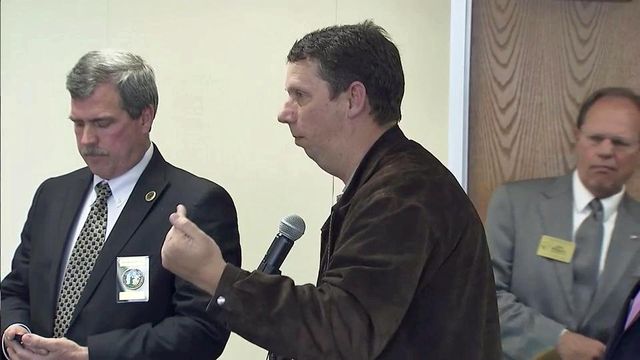House panel debates constitutional convention
Supporters and opponents of a federal constitutional convention made their respective cases Wednesday afternoon before the House Judiciary I Committee.
Posted — UpdatedUnder Article 5 of the Constitution, the document can be amended in two ways. The first is the process that's been used throughout the country's history: Congress passes an amendment which must then be ratified by three-fourths of the states.
The second method would be a constitutional convention, which must be called for by two-thirds to three-quarters of the states. The convention could draft amendments that would then go to the states for ratification, bypassing Congress completely. As in the first method, three-fourths of the states – 38 of the 50 – would have to ratify the amendments before they would become part of the Constitution.
The panel discussed, but did not vote on, two proposals: House Joint Resolution 132, which would rescind all outstanding calls by North Carolina for a constitutional convention, and House Bill 321, which would put the state on record as calling for a constitutional convention.
Rep. Jonathan Jordan, R-Ashe, sponsor of the joint resolution, said the state has at least five such calls on the record, dating from 1867 through 1979. His resolution would wipe those calls off the books.
Jordan warned that such a convention, once it's called, could become a "runaway convention" that could not be limited or controlled because the Constitution puts popular sovereignty above state or federal power.
"It could do anything it wants," he said. "It could completely uproot our entire form of government.”
In contrast, Jordan said, the first method can be controlled because the people vote for their members of Congress.
"It’s been used 27 times, and it’s worked perfectly fine," he said.
Jeff Lewis of Vanceboro spoke in favor of the resolution to the committee, arguing that the federal and state constitutions already give people the authority "to rein in out-of-control government."
"The constitution, whether it’s the federal or the state, is not the problem," Lewis said. "It’s us."
The other proposal, House Bill 321, would explicitly put the state on the list of those calling for a constitutional convention. That measure is sponsored by Rep. Bert Jones, R-Rockingham.
"I think there is a wide agreement among Americans that we need to place some restraints on the federal government that it’s not going to place on itself," Jones said. "I think [the founders] clearly foresaw that this federal government they created could be become too powerful, too broad in scope, too broad in cost."
He disagreed that the constitutional convention would be uncontrollable, pointing out that 38 states would still have ratify any amendments it approved.
"What we’re proposing is what the constitutional founders said," he argued. "I can’t accept that argument that we should somehow trust that Congress will do the right thing but that the states will not."
Rep. Dennis Riddell, R-Alamance, said a convention is needed "to curb the excesses of Washington, D.C."
“I look at this as an intervention of the states, just as if you have a drug-addled family member whose behavior is out of control,” Riddell said.
Michael Farris with the national Convention of States Project spoke in favor of House Bill 321, arguing that the states would have to agree on the subject matter ahead of time.
"You can’t change the subject matter. The idea that someone could change the agenda is not acceptable, legally, historically, factually. It’s not capable of a runaway convention," Farris said.
Rep. Darren Jackson, D-Wake, countered Farris by noting that the Constitutional Convention that generated the Bill of Rights in 1787 went far beyond its originally agreed-upon scope. He also cited an opinion by former U.S. Supreme Court Chief Justice Warren Burger that, "There is no way to ensure that a convention will obey. After a convention is convened, there will be no way to stop them."
Gary Kennedy from Youngsville also spoke in support of the convention call, telling the committee that the country's "enemy is within."
"We have a runaway convention now. It’s called the Congress and the executive branch and the judicial branch," Kennedy said. "When you give people that kind of power, they wil be corrupt.
"I can see no other peaceful solution to the problems we face. I don’t want to see armed rebellion," he said.
"We have to do something," agreed Rep. Bob Steinburg, R-Chowan. "This situation, this Washington, is not going to fix itself, and it’s got to happen soon."
"No amount of electing good people is going to change Washington, D.C., structurally, the way it needs to be changed," Farris added.
Jackson suggested that another peaceable solution might be independent redistricting reform.
"We draw districts where those congressional representatives don’t worry about losing. If we sat down and drew 13 competitive districts and every other state did that, we wouldn’t need a constitutional convention," Jackson said.
Chairman Rep. Leo Daughtry, R-Johnston, said the committee would eventually vote on both proposals, but he didn't say when.
Lt. Gov. Dan Forest is also a supporter of the movement to call a constitutional convention.
Related Topics
• Credits
Copyright 2024 by Capitol Broadcasting Company. All rights reserved. This material may not be published, broadcast, rewritten or redistributed.





